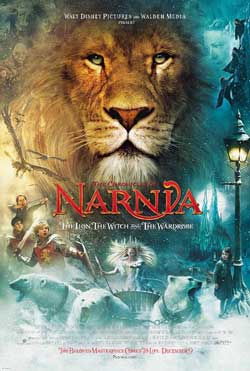 CS Lewis’ fantasy classic, The Chronicles of Narnia: The Lion, The Witch and the Wardrobe comes to theaters this weekend, bringing state of the art effects to the story of four young children in wartime England who are magically transported to the land of Narnia.
CS Lewis’ fantasy classic, The Chronicles of Narnia: The Lion, The Witch and the Wardrobe comes to theaters this weekend, bringing state of the art effects to the story of four young children in wartime England who are magically transported to the land of Narnia.
William Moseley and Anna Popplewell play the oldest of those four children – Peter and Susan. They get drawn into the world of Narnia by their sister Lucy, and further enmeshed in the bad situation there by their brother Edmund. Moseley and Popplewell have been immersed in Narnia now for a couple of years, and they seem no worse the wear for it. They were bright and charming teenagers, happy to field even the lamest questions the journalists at my roundtable could come up with.
Q: Did you grow up with these books?
Popplewell: Yeah. I read the books when I was about 7, and reread them when I was 14, during the casting process.
Moseley: I used to listen to the stories when I was about 7 years old. I always loved them. I used to listen to the story tape. Then when I was 15 I was auditioning for the part and I wasn’t sure if the stories would still relate to me in some ways, because I was a little bit cool. I’m a teenager! Then I read the stories and I still loved them. The issues still relate to the me, if not even moreso. I loved them and they confirmed my thoughts of being in the film.
Q: What was the audition process like for you?
Moseley: It was very, very long. It was 18 months long. Actually Anna and I met each other at one of the first auditions. Then we went through and met Georgie [Henley, playing Lucy] and Skandar [Keynes, playing Edmund]. It was a lot of hard work. They auditioned something like 2500 kids.
Popplewell: When you go in for an audition you put yourself up for rejection. You accept that you might be too tall, too short, not good enough. I think at first you try to not too emotionally involved, but when you get to the end of an 18 month process it’s very nerve-wracking.
Q: Did you guys get a lot of weapons training?
Popplewell: I got to do some archery, which is fun.
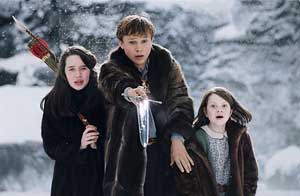 Moseley: I had a stunt trainer who would teach me kick boxing, and then I would learn the choreographed moves in sword practice. He would say to use the sword as an extension of your arm. I would learn the special awareness between two stunt people. I also learned horse riding; I learned stunt riding for seven and a half months. I got to a stage where I could gallop this white Andalusian bareback in full armor and with a sword and shield.
Moseley: I had a stunt trainer who would teach me kick boxing, and then I would learn the choreographed moves in sword practice. He would say to use the sword as an extension of your arm. I would learn the special awareness between two stunt people. I also learned horse riding; I learned stunt riding for seven and a half months. I got to a stage where I could gallop this white Andalusian bareback in full armor and with a sword and shield.
Q: You didn’t have a stunt double to do that stuff?
Moseley: I did, but they spent most of the say sitting around, because I really wanted to do that stuff myself. I didn’t want someone to do my stunts, they’re my stunts, and I wanted to do them. I said to Mark Johnson, the producer, ‘Mark, please, just one more stunt.’ ‘OK, this is the last one!’
Popplewell: I think Mark adapted the phrase, ‘You can do it, but you can’t fall off.’
Q: What was the most surprising thing that happened to you during the making of this film?
Popplewell: The most surprising thing to me was the scale of the movie. I loved the books and of course read the script, but when I got to New Zealand I was surprised by the size of the sets and the number of the crew. I had never been on such a big production. I am continuing to be surprised by the amount of press it’s receiving, the amount of attention.
Q: You probably had to do a lot of imagining because you’re acting against a lot of creatures and landscapes that would be added in later digitally.
Moseley: I think it was really down to what our Aslan looks like. What our Beaver looks like, what our werewolf looks like. We had read the stories so we already had an image in our minds of what it looked like to us. So we would take that picture, take that image and put it out there. That, I suppose, is what’s interesting about seeing the final version – we’re seeing Andrew’s vision, Andrew’s imagination, Andrew’s personal lion, werewolf and beaver. I don’t think it was ever a problem, I think it was a bonus.
Q: Was it harder to imagine what was around you or what animal you were talking to?
Popplewell: I think what was around us because imagining something in front of you, it’s just one interaction. Whereas the backgrounds are more subtle. For instance when we were shooting most of the snow scenes we were indoors, in heavy coats and lots of layers, and it was sometimes difficult to remember to be cold. I think the backgrounds are more difficult.
Moseley: The backgrounds were – the sets, I mean, were amazing. The detail that went into each set was probably as much to bring us into a scene as it was to bring the audience into the scene. There were tiny little details you would never see as an audience, you know, miniscule things inside Mrs. Beaver’s hut. Little things for her children.
Popplewell: Knitting needles.
Moseley: Little sleds for them to go out on. It was absolutely amazing. How could we not feel like we were in Narnia on these snow sets and these water sets?
Q: The film was shot chronologically, to allow you to age during the film. That means that even more than in other shoots you were lured into the world of Narnia, and into that relationship as a family. How difficult was it to leave that when it was all over?
Popplewell: It was quite weird. It was like coming out of the wardrobe, I suppose. We were part of this amazing adventure and now had to come back to reality. I was nervous about coming back from New Zealand and going to regular school. I hadn’t been to school with my teenage friends in six months. But actually it went swimmingly and was made easy for me.
Moseley: For me, because it was about my progression to adulthood, I suppose, the weekends I would hang out with the adults. Some of the assistant directors were 20 or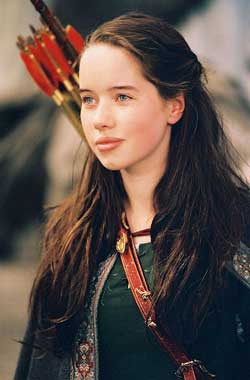 something, and I would spend time with me. It was bizarre because I was at this stage of independence and my friends were all at school. Now having to go back to school and having to repeat a year, because I’ve almost taken a gap year through this whole process, I find that very, very bizarre. I’ve already had that feel, that understanding of living by myself and knowing how hard it can be without mum doing all the washing.
something, and I would spend time with me. It was bizarre because I was at this stage of independence and my friends were all at school. Now having to go back to school and having to repeat a year, because I’ve almost taken a gap year through this whole process, I find that very, very bizarre. I’ve already had that feel, that understanding of living by myself and knowing how hard it can be without mum doing all the washing.
Q: Where do you go from here?
Moseley: I really want to finish school – who doesn’t finish high school? I really want to finish high school and then I would love to get into the world and learn as much as I can. I’m the kind of person who learns from doing things; if I’m out there experiencing things I’m much better.
Q: Peter is sort of the dad of the group. Sometimes he can seem a little stiff. How do you approach him?
Moseley: I suppose I’m very similar. I’m the eldest of my family, and my family would remind me of how bossy I am.
Popplewell: Leadership skills!
Moseley: I thought of myself in that role. I thought about his moral dilemmas and the choices he has to make, and how difficult that is for him. So I sort of felt that I was going on the same journey as Peter; I was stepping on a set for the first time, I was slightly insecure about my actions, I was not so full with everything I was doing. But my confidence grew, and as we went through Narnia and everything developed.
Q: Susan is very sensible, I guess. Is that like you? What’s your take on her?
Popplewell: I think it’s interesting. Susan is the least developed of the four characters in the book. When people asked me who I was going off to New Zealand to play and I said Susan, they said, ‘Oh yeah, the boring one.’ I thought it was OK that she was boring but I wanted people to understand why she was that way. It was important for me to build on CS Lewis’ writing, which Ann [Peacock, screenwriter] really did, and to make people understand why she felt to skeptical about Narnia. Being forced into a maternal role while being evacuated and yet Peter is the one with the authority. She feels frustrated because while she feels responsible she can’t really make the decisions. She can’t call the shots. She had to grow up rather quickly, and the lesson she learns from Narnia is that it’s OK to be a child. It’s OK to be a kid.
Q: You have toys and video games featuring you now. That must be strange.
Popplewell: My brother bought the video game and walked me into the lamp post about eight times. I think it’s very weird to see your face on stuff in public places. I was confronted by a cereal box the other day which took me by surprise. Most of it’s going straight over my head.
Moseley: As long as one child isn’t above everybody else. It’s four children stepping forward 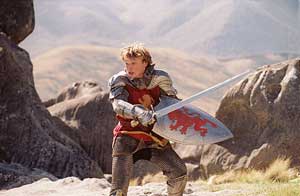 as a family. We experienced Narnia and New Zealand together for the first time, and we’re experiencing all this publicity together for the first time. If anyone does step on the platform we’re very brutally honest in bringing them back down to Earth.
as a family. We experienced Narnia and New Zealand together for the first time, and we’re experiencing all this publicity together for the first time. If anyone does step on the platform we’re very brutally honest in bringing them back down to Earth.
Skandar reminds me that I have a picture in a magazine and that I look very ugly! We’re very quick to bring each other down. And our siblings are brutally honest with us.
Q: You seem very realistic when you react to the wolves jumping out at you. What were you really reacting to?
Popplewell: I was amazed when I finally saw the film because I was making an effort but I was worried about us looking real next to these animated characters. But it was really just Andrew’s direction, telling us what was in the scene or coming down on the floor and prowling around like a wolf. He really did everything to make it real and help us.
Q: Were they all CGI wolves or were there real wolves?
Popplewell: There were some real wolves on set. Actually, one of the shots, where we’re running away from Father Christmas, when we think he’s the White Witch, there were these real wolves around the set. They weren’t allowed in the set when we were filming. Andrew told me he let one into the studio, so I was running really fast. I thought he was joking, but a little bit of me believed him.
Q: At the end of the film you guys are all grown up. What did you guys think of the actors they hired to play you as grown ups?
Popplewell: That was the weirdest thing, knowing they were going to cast those people. I actually walked into Sophie [Winkleman] in London and she said, ‘I’m sorry, are you Susan?’ I was so freaked out because she spoke like me. I think she went to an all girl’s London school as well, and it was a very similar setting. It was very weird.
I thought they looked really great, and Rachel Henley plays the older Lucy, and she’s Georgie’s older sister, which I think was great.
Moseley: I actually met Noah [Huntley] at a wig fitting because he was getting his hair like me. It was totally bizarre. But then we actually met up for tea and I really, really found him interesting. Whether that’s because I find myself interesting… but he gave me some really great advice, some of the best advice I got throughout the film. He was really nice and really pleasant and it was nice to have that support. It was totally bizarre, but you have to take it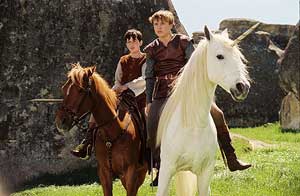 like it comes.
like it comes.
Q: I heard you had a problem with some mice on set.
Popplewell: Luckily we all had doubles on the film. Andrew asked me what I was most afraid of, and I said mice. I’m absolutely petrified of them. He thought that was funny because I had to do a scene with mice at the Stone Table. Silly me, I thought these mice would be computer generated. We have a lot of animals in the film, and apart from the wolves they pretty much are all computer generated. But Andrew said, ‘Nope, these mice will be real.’ I don’t think I believed him until the day of shooting when he held a real mouse up to me and I screamed. I chickened out, and none of the shots with the mice have my face in them since it’s a double.
Q: William, was there anything on set that scared you at all?
Moseley: Anna!
Popplewell: Actually all the scenes with me where you don’t see his face, that’s a double, too!